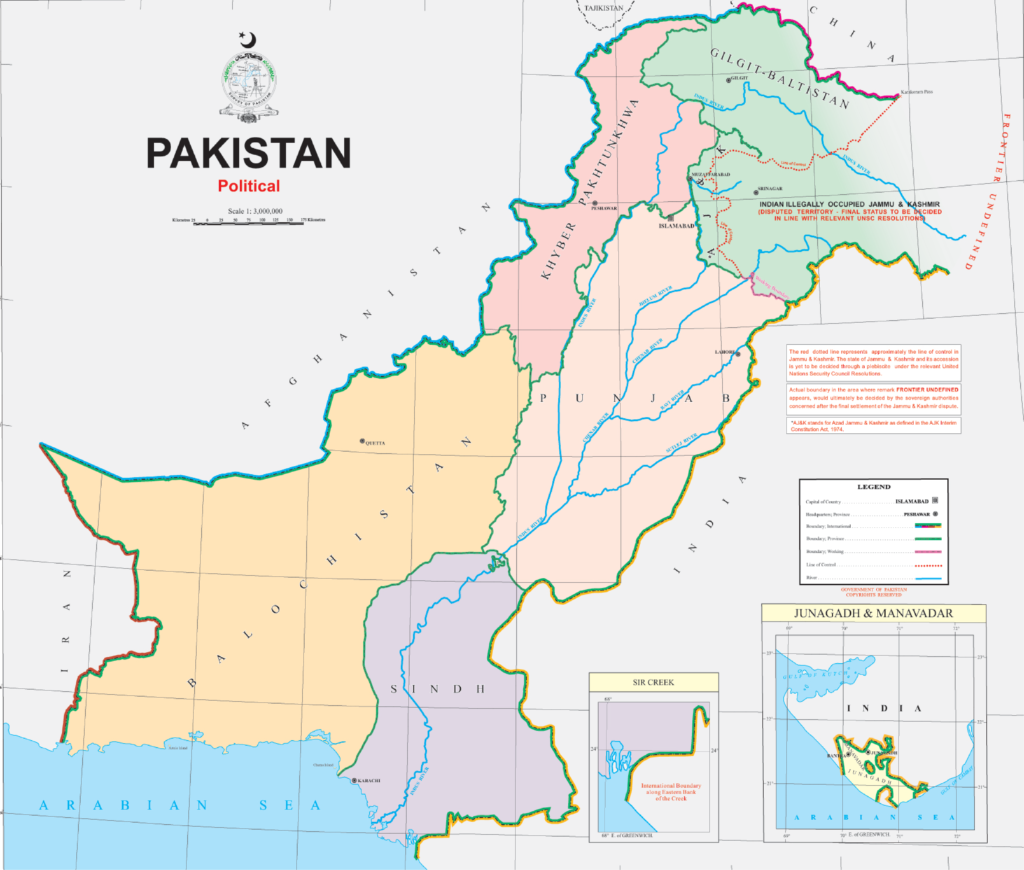A Legacy of Terror and Foreign Exploitation: The Baloch Liberation Army (BLA)
Recent attacks claimed by the Baloch Liberation Army (BLA), including brazen assaults on security forces and civilians, have once again exposed the group’s terrorist agenda and its destabilising role in Pakistan. While the BLA masquerades as a movement for Baloch rights, its actions—marked by violence, anti-state rhetoric, and foreign patronage—reveal a darker truth. A legacy of terror and foreign exploitation has fully exposed it as a militant organisation dedicated to sowing chaos, undermining Pakistan’s sovereignty, and sabotaging regional stability.

Pakistan’s security forces announced on Wednesday night that they had ended a military operation against a group of separatists who had hijacked a train on Tuesday, rescuing 346 passengers.
Jaffar Express, the train was travelling from Quetta, the provincial capital of the southwestern province of Balochistan, to Peshawar, the capital of the northwestern Khyber Pakhtunkhwa province, when it was attacked.

A History of Violence and Separatism
Foreign Patronage: A Tool for Proxy Warfare
Mahrang Baloch: A Mouthpiece for Militancy
Anti-State Agenda and Global Condemnation
Above all, they have lost the narrative that they are a legitimate freedom struggle. All over the world, their act was seen as an act of terror directed against civilians, condemned by all powers of the world. This is a huge loss to their PR campaign globally. They have lost the moral high ground of being victims and have now become unforgivable terrorists…..
Even in Pakistan, the tide has turned against them……
Condemnation Overview

The international community has expressed strong disapproval of the terrorist attack on the Jaffar Express Train in Pakistan, which occurred on March 11, 2025, in Balochistan. Key actors, including the United Nations, the United States, the United Kingdom, and China, have issued statements condemning the attack and supporting Pakistan.
United Nations Response
The UN Security Council issued a press statement condemning the attack as “heinous and cowardly,” highlighting the loss of at least 25 lives and calling for accountability. They expressed condolences to the victims’ families and urged cooperation with Pakistan to bring the perpetrators to justice.
United States Response
The US Embassy in Islamabad strongly condemned the attack via an X post, extending sympathies to victims and their families, and reaffirmed its partnership with Pakistan to ensure citizen safety, emphasising that Pakistanis deserve to live free from violence and fear.
United Kingdom Response
The UK Foreign Secretary David Lammy condemned the attack in an X post, aligning with global efforts to denounce terrorism in Balochistan.
China Response
China’s Foreign Ministry Spokesperson Mao Ning strongly condemned the attack, reaffirming firm support for Pakistan in combating terrorism and enhancing security cooperation to maintain regional stability.
Unexpected Detail
An interesting finding is the mention of additional countries like Germany, Russia, and Iran condemning the attack, suggesting broader international support, though specific statements from these nations were less detailed in available reports.
Analysis of the International Community’s Condemnation of the Jaffar Express Train Attack in Pakistan
This is how the international community has responded to the terrorist attack on the Jaffar Express Train in Pakistan, which occurred on March 11, 2025, in Balochistan’s Bolan district. The attack, claimed by the Balochistan Liberation Army (BLA), involved hijacking the train, taking hostages, and resulted in significant casualties, prompting widespread international condemnation. The analysis is based on official statements, news reports, and international organisation responses, focusing on the nature and scope of the condemnation.
Background and Context
On March 11, 2025, the Jaffar Express, a passenger train travelling from Quetta to Peshawar with approximately 440 passengers, was attacked by BLA militants. The attackers detonated explosives, opened fire, and took hostages, leading to a military operation that ended on March 12, 2025, with 33 militants killed and 21 hostages and 4 soldiers dead. This incident, occurring in a region with a history of separatist insurgency, drew significant international attention due to its scale and the involvement of civilians.
The international community’s response is critical, given Pakistan’s strategic importance and ongoing counter-terrorism efforts. Condemnations typically include official statements from governments, international organisations, and sometimes regional bodies, reflecting global norms against terrorism and solidarity with affected nations.
Responses by the International Community
United Nations
The United Nations has been vocal in its condemnation. On March 14, 2025, the UN Security Council, through President Christina Markus Lassen of Denmark, issued a press statement ([UN Security Council Press Statement](https://press.un.org/en/2025/sc16019.doc.htm)) condemning the attack in the “strongest terms” as a “heinous and cowardly terrorist attack.” The statement noted the loss of at least 25 Pakistani nationals and called for holding perpetrators, organisers, financiers, and sponsors accountable, urging all states to cooperate with Pakistan. UN Secretary-General António Guterres also “strongly condemned” the hijacking and called for the immediate release of hostages, as reported in Wikipedia ([2025 Jaffar Express hijacking – Wikipedia](https://en.wikipedia.org/wiki/2025_Jaffar_Express_hijacking)).
United States
The US Embassy in Islamabad responded promptly, stating on March 12, 2025, via an X post, as reported by Radio Pakistan ([UN, US, UK, China condemn attack on Jaffer Express Train](https://www.radio.gov.pk/12-03-2025/us-condemns-attack-on-jaffar-express-train)) and The Express Tribune ([US embassy strongly condemns Jaffar Express attack, expresses solidarity with Pakistan](https://tribune.com.pk/story/2533891/us-embassy-strongly-condemns-jaffar-express-attack)). The statement strongly condemned the attack and hostage-taking, labeling BLA as a US-Specially Designated Global Terrorist group. It extended deepest sympathies and condolences to victims and their families, emphasising that the Pakistani people deserve to live free from violence and fear, and reaffirmed the US as a steadfast partner in ensuring Pakistan’s security.
United Kingdom
The UK Foreign Secretary David Lammy condemned the attack in a social media post on X on March 12, 2025, as reported by Radio Pakistan ([UN, US, UK, China condemn attack on Jaffer Express Train](https://www.radio.gov.pk/12-03-2025/us-condemns-attack-on-jaffar-express-train)). The statement was brief, aligning with the UK’s stance against terrorism, though specific details were not extensively covered in available reports.
China
China’s response was detailed and supportive. On March 12, 2025, Foreign Ministry Spokesperson Mao Ning, during a regular briefing, strongly condemned the attack, as reported by Radio Pakistan ([UN, US, UK, China condemn attack on Jaffer Express Train](https://www.radio.gov.pk/12-03-2025/us-condemns-attack-on-jaffar-express-train)) and The Tribune ([China condemns Jaffar Express attack, pledges strong support to Pakistan](https://www.tribuneindia.com/news/world/china-condemns-jaffar-express-attack-pledges-strong-support-to-pakistan/)). China firmly opposed terrorism in all forms, reaffirmed its support for Pakistan in combating terrorism, and expressed readiness to strengthen counter-terrorism and security cooperation, emphasizing regional stability and civilian safety.
European Union and Other Countries
While specific EU statements were less accessible, reports from Minute Mirror ([International outrage after Jaffar Express attack, global condemnations overwhelm](https://minutemirror.com.pk/international-outrage-after-jaffar-express-attack-global-condemnations-overwhelm-368286/)) and Wikipedia ([2025 Jaffar Express hijacking – Wikipedia](https://en.wikipedia.org/wiki/2025_Jaffar Express hijacking)) suggest the EU condemned the attack, with Ambassador Riina Kionka mentioned in some sources. Additionally, countries like Germany, Russia, Turkiye, Norway, and Iran were noted to have registered condemnation, with Russian President Vladimir Putin and Belarusian President Aleksandr Lukashenko making direct statements, as per Wikipedia, though specific details were not verified in official channels.
Historical Context and Trends
The Jaffar Express attack aligns with a history of BLA activities targeting Pakistani infrastructure, notably the 2016 attack near Machh and the 2024 Quetta railway station bombing. International responses typically follow a pattern of condemnation, calls for justice, and support for counter-terrorism, reflecting global norms against terrorism. The involvement of the UN Security Council and major powers like the US and China underscores Pakistan’s strategic importance, especially given regional dynamics with Afghanistan and India, as mentioned in some reports.
Conclusion
This survey note confirms that the international community, led by the UN, US, UK, and China, has strongly condemned the Jaffar Express attack, with statements emphasising sympathy, accountability, and support for Pakistan. While additional countries’ responses suggest broader condemnation, verified details are limited. The responses highlight a unified stance against terrorism, with potential for enhanced international cooperation in counter-terrorism efforts.
Key Citations
– [UN Security Council Press Statement on Terrorist Attack in Pakistan](https://press.un.org/en/2025/sc16019.doc.htm)
– [UN, US, UK, China condemn attack on Jaffer Express Train](https://www.radio.gov.pk/12-03-2025/us-condemns-attack-on-jaffar-express-train)
– [US embassy strongly condemns Jaffar Express attack, expresses solidarity with Pakistan](https://tribune.com.pk/story/2533891/us-embassy-strongly-condemns-jaffar-express-attack)
– [2025 Jaffar Express hijacking – Wikipedia](https://en.wikipedia.org/wiki/2025_Jaffar_Express_hijacking)
– [International outrage after Jaffar Express attack, global condemnations overwhelm](https://minutemirror.com.pk/international-outrage-after-jaffar-express-attack-global-condemnations-overwhelm-368286/)
– [China condemns Jaffar Express attack, pledges strong support to Pakistan](https://www.tribuneindia.com/news/world/china-condemns-jaffar-express-attack-pledges-strong-support-to-pakistan/)

